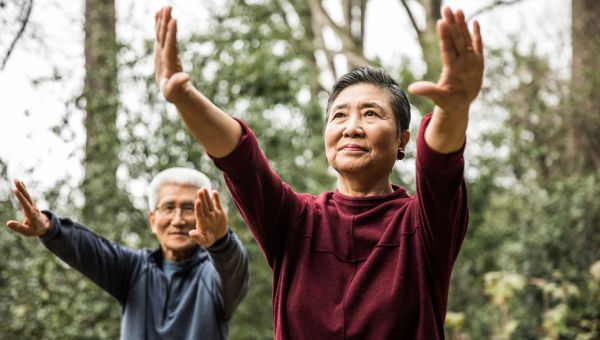7 science-backed ways to help keep your memory strong
It’s not too late to start adopting these mind-preserving habits.
Updated on April 25, 2024

We all forget things from time to time. Where did I put those car keys? What did I need from the store again? The fact is, some forgetfulness is a normal part of aging. The good news is that there are things you can do to help keep your memory working well into old age. Here’s the science behind keeping your memory sharp.

Read—and Write
Reading isn’t just a great way to unwind after a long day. Challenging your mind with books or other written material is a great way to exercise your cognitive skills. Whether it’s reading a novel, a how-to book, a newspaper or magazine, or simply browsing at the library, engaging in the written… Show More
Reading isn’t just a great way to unwind after a long day. Challenging your mind with books or other written material is a great way to exercise your cognitive skills. Whether it’s reading a novel, a how-to book, a newspaper or magazine, or simply browsing at the library, engaging in the written word stimulates your mind.
You can also reap the benefits of reading while taking advantage of the mind-enhancing power of creativity by writing your own letters, stories, or even a memoir.
Show Less
Move Your Body
Moving more is good for your heart, bones, muscles, and your waistline. It’s also associated with a healthier brain, as it can boost your cognition skills, including thinking and memory.
Any exercise carries benefits, from walking the dog to taking the stairs instead of the elevator. But some types… Show More
Moving more is good for your heart, bones, muscles, and your waistline. It’s also associated with a healthier brain, as it can boost your cognition skills, including thinking and memory.
Any exercise carries benefits, from walking the dog to taking the stairs instead of the elevator. But some types of exercise offer an even bigger boost for your brain. According to the Centers for Disease Control and Prevention (CDC), one of the best exercises for cognition, memory, and the body is dancing. Even older adults who were already experiencing mild cognitive impairment saw improvements in memory and thinking after taking a ballroom dance class over the course of 10 months.
You can find dance classes at community centers, dance studios, or the local YMCA. Or try learning at home through videos or online classes. Whether you sign up for dance class, it’s best to also establish a habit of daily walking or a similar exercise that you can easily incorporate into your day. Treat it like anything else you do for self-care on a daily basis—like brushing your teeth—and make it a part of your everyday routine.
Show Less
Be mindful
Chronic stress can have effects on memory and may even raise the risk of developing Alzheimer’s disease or other forms of dementia. Mindfulness practices are especially effective when it comes to stress relief and may even boost your memory in the process.
Mindfulness typically involves focusing… Show More
Chronic stress can have effects on memory and may even raise the risk of developing Alzheimer’s disease or other forms of dementia. Mindfulness practices are especially effective when it comes to stress relief and may even boost your memory in the process.
Mindfulness typically involves focusing your attention on sensations in the body, such as your breathing, in the present moment, without judgment or expectation. Following a daily mindfulness meditation practice can help lower your blood pressure, relax your muscles, and ease your stress levels. If meditation is not for you, you can try a variety of relaxation techniques that incorporate mindfulness to reduce stress and promote resilience. These include deep breathing, tai chi, or walking in nature.
Show Less
Do some good
Be generous with your time. Not only can regularly volunteering help reduce stress and lower blood pressure, it is also associated with a lower risk of cognitive impairment.
People who spend their time doing activities that are truly meaningful to them tend to live longer, according to the National… Show More
Be generous with your time. Not only can regularly volunteering help reduce stress and lower blood pressure, it is also associated with a lower risk of cognitive impairment.
People who spend their time doing activities that are truly meaningful to them tend to live longer, according to the National Institute on Aging. And a 2023 systematic review published in the Journal of Multidisciplinary Healthcare found evidence that volunteering can improve cognition.
Look into how you can help your community, whether it’s tutoring youth, guiding visitors at a museum, helping animals at a shelter, or assisting any cause that’s dear to your heart.
Show Less
Learn something new
Like your body, your brain needs exercise. Challenging yourself to learn new things can help stimulate brain cells to connect and communicate with each other. Some research has shown that the more education a person has, the likelier they are to have better cognitive functioning as they grow older.… Show More
Like your body, your brain needs exercise. Challenging yourself to learn new things can help stimulate brain cells to connect and communicate with each other. Some research has shown that the more education a person has, the likelier they are to have better cognitive functioning as they grow older.
Even if you don’t have an advanced degree, it’s never too late to start building and maintaining new brain connections. While learning a new language or diving into a new field of study is great, it doesn’t have to be that fancy or take a lot of time. You might try to learn a new skill at work, take on a new hobby at home like quilting or photography, or learn about soil and plants as you create a garden in the backyard or community garden.
Show Less
Be creative
Pablo Picasso, the famous painter, once said, “The purpose of art is washing the dust of daily life off our souls.” He didn’t mention knocking the cobwebs from our minds, but art can help your memory and help stave off dementia or mild cognitive impairment.
A 2023 systematic review… Show More
Pablo Picasso, the famous painter, once said, “The purpose of art is washing the dust of daily life off our souls.” He didn’t mention knocking the cobwebs from our minds, but art can help your memory and help stave off dementia or mild cognitive impairment.
A 2023 systematic review published in Frontiers in Psychology found that being actively engaged in the arts was linked to lower rates of cognitive decline in healthy older adults, not to mention general improvements in quality of life and well-being.
It’s important that the engagement is active, rather than passive. Active engagement in arts includes creating art and going on outings to venues like theaters or art galleries. (Sorry, but watching TV doesn’t count.) What makes a theater or gallery experience more stimulating? In addition to the artistic element, the shared experience makes it socially meaningful. So, to help maintain cognitive health, seek to experience art in person and help support the work of artists in your community.
Show Less
Ease chronic pain
During 2021, nearly 52 million American adults experienced chronic pain, the kind that lasts for three or more months. According to the CDC, chronic pain has been linked to a higher risk of Alzheimer’s disease and other forms of dementia. A 2017 study in JAMA Internal Medicine tracked… Show More
During 2021, nearly 52 million American adults experienced chronic pain, the kind that lasts for three or more months. According to the CDC, chronic pain has been linked to a higher risk of Alzheimer’s disease and other forms of dementia. A 2017 study in JAMA Internal Medicine tracked more than 10,000 people from 2000 to 2012. It found that for people experiencing persistent moderate or severe pain, their memory declined nearly 10 percent faster than those without persistent pain and their risk of dementia rose almost 8 percent faster.
There are many options for pain relief, from exercise therapy to cognitive behavioral therapy to acupuncture and massage. Medications are also a valuable tool, when used safely with the guidance of your healthcare provider. While opioid medications work well on a short-term basis for acute pain, they shouldn’t be the first option and shouldn’t be used routinely for chronic pain. Try these opioid-free ways to feel better instead.
Show Less
Centers for Disease Control and Prevention. Chronic Pain Among Adults — United States, 2019–2021. April 14, 2023.
Centers for Disease Control and Prevention. Dance Your Way to Better Brain Health. Page last reviewed June 4, 2018.
Centers for Disease Control and Prevention. Physical Activity Boosts Brain Health. Page last reviewed February 24, 2023.
Centers for Disease Control and Prevention. Reducing Risk of Alzheimer’s Disease. Page last reviewed September 13, 2022.
Centers for Disease Control and Prevention. Safely and Effectively Managing Pain Without Opioids. Page last reviewed June 11, 2021.
Chen J, Wang X, Xu Z. The Relationship Between Chronic Pain and Cognitive Impairment in the Elderly: A Review of Current Evidence. J Pain Res. 2023;16:2309-2319. Published 2023 Jul 7.
Fioranelli M, Roccia MG, Garo ML. The role of arts engagement in reducing cognitive decline and improving quality of life in healthy older people: a systematic review. Front Psychol. 2023 Aug 21;14:1232357.
Fisher Center for Alzheimer’s Research Foundation. 6 Ways to Keep Your Memory Sharp. February 8, 2023.
Harvard Health. Exercise can boost your memory and thinking skills. October 20, 2023.
Harvard Health. 7 ways to keep your memory sharp at any age. March 30, 2020.
Keefer A, Steichele K, Graessel E, Prokosch HU, Kolominsky-Rabas PL. Does Voluntary Work Contribute to Cognitive Performance? - An International Systematic Review. J Multidiscip Healthc. 2023 Apr 25;16:1097-1109.
Lazarou I, Parastatidis T, Tsolaki A, et al. International Ballroom Dancing Against Neurodegeneration: A Randomized Controlled Trial in Greek Community-Dwelling Elders With Mild Cognitive impairment. Am J Alzheimers Dis Other Demen. 2017;32(8):489-499.
Mayo Clinic Health System. 6 tips to keep your brain healthy. December 29, 2022.
National Institute on Aging. Cognitive Health and Older Adults. Page last reviewed October 1, 2020.
Pragya SU, Mehta ND, Abomoelak B, et al. Effects of Combining Meditation Techniques on Short-Term Memory, Attention, and Affect in Healthy College Students. Front Psychol. 2021;12:607573. Published 2021 Mar 5.
Whitlock EL, Diaz-Ramirez LG, Glymour MM, Boscardin WJ, Covinsky KE, Smith AK. Association Between Persistent Pain and Memory Decline and Dementia in a Longitudinal Cohort of Elders. JAMA Intern Med. 2017;177(8):1146-1153.
Youngs MA, Lee SE, Mireku MO, Sharma D, Kramer RSS. Mindfulness Meditation Improves Visual Short-Term Memory. Psychol Rep. 2021;124(4):1673-1686.
More On


video

article

slideshow


video


video
